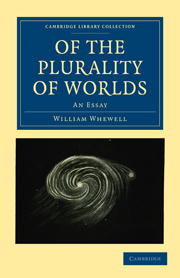Book contents
- Frontmatter
- Preface
- Contents
- CHAPTER I ASTRONOMICAL Discoveries
- CHAPTER II Astronomical Objection to Religion
- CHAPTER III The Answer from the Microscope
- CHAPTER IV Further Statement of the Difficulty
- CHAPTER V Geology
- CHAPTER VI The Argument from Geology
- CHAPTER VII The Nebulsæ
- CHAPTER VIII The Fixed Stars
- CHAPTER IX The Planets
- CHAPTER X Theory of the Solar System
- CHAPTER XI The Argument from Design
- CHAPTER XII The Unity of the World
- CHAPTER XIII The Future
CHAPTER II - Astronomical Objection to Religion
Published online by Cambridge University Press: 05 October 2010
- Frontmatter
- Preface
- Contents
- CHAPTER I ASTRONOMICAL Discoveries
- CHAPTER II Astronomical Objection to Religion
- CHAPTER III The Answer from the Microscope
- CHAPTER IV Further Statement of the Difficulty
- CHAPTER V Geology
- CHAPTER VI The Argument from Geology
- CHAPTER VII The Nebulsæ
- CHAPTER VIII The Fixed Stars
- CHAPTER IX The Planets
- CHAPTER X Theory of the Solar System
- CHAPTER XI The Argument from Design
- CHAPTER XII The Unity of the World
- CHAPTER XIII The Future
Summary
Such astronomical views, then, as those just stated, we may suppose to be those to which Chalmers had reference, in the argument of his Astronomical Discourses. These real or supposed discoveries of astronomers, or a considerable part of them, were the facts which were present to his mind, and of which he there discusses the bearings upon religious truths. This multiplicity of systems and worlds, which the telescopic scrutiny of the stars is assumed to have disclosed, or to have made probable, is the main feature in the constitution of the universe, as revealed by science, to which his reflections are directed. Nor can we say that, in fixing upon this view, he has gone out of his way, to struggle with obscure and latent difficulties, such as the bulk of mankind know and care little about. For in reality, such views are generally diffused in our time and country, are common to all classes of readers, and as we may venture to express it, are the popular views of persons of any degree of intellectual culture, who have, directly or derivatively, accepted the doctrines of modern science. Among such persons, expressions which imply that the stars are globes of luminous matter, like the sun; that there are, among them, systems of revolving bodies, seats of life and of intelligence; are so frequent and familiar, that those who so speak, do not seem to be aware that, in using such expressions, they are making any assumption at all; any more than they suppose themselves to be making assumptions, when they speak of the globular form of the earth, or of its motion round the sun, or of its revolution on its axis.
- Type
- Chapter
- Information
- Of the Plurality of WorldsAn Essay, pp. 16 - 22Publisher: Cambridge University PressPrint publication year: 2009First published in: 1853



